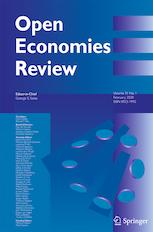
The Yen exchange rate and the hollowing out of the Japanese industry
Belke, Ansgar / Ulrich VolzExterne Publikationen (2020)
in: Open Economies Review 31, 371-406
DOI: https://doi.org/10.1007/s11079-019-09576-0
Information
Since the demise of the Bretton Woods system, the yen has seen several episodes of strong appreciation, including in the late 1970s, after the 1985 Plaza Agreement, the early and late 1990s and after 2008. These appreciations have not only been associated with “expensive yen recessions” resulting from negative effects on exports; since the late 1980s, the strong yen has also raised concerns about a de-industrialisation of the Japanese economy. Against this backdrop, the article investigates the effects of changes to the yen exchange rate on the hollowing out of the Japanese industrial sector. To this end, the article uses both aggregate and industry-specific data to gauge the effects of yen fluctuations on the output and exports of different Japanese industries, exploiting new data for industry-specific real effective exchange rates. Our findings support the view that the periods of yen appreciation had more than just transitory effects on Japanese manufacturing. The results also provide indication of hysteresis effects on manufacturing. While there are certainly also other factors that have contributed to a hollowing out of Japanese industry, a strong yen played a role, too.

